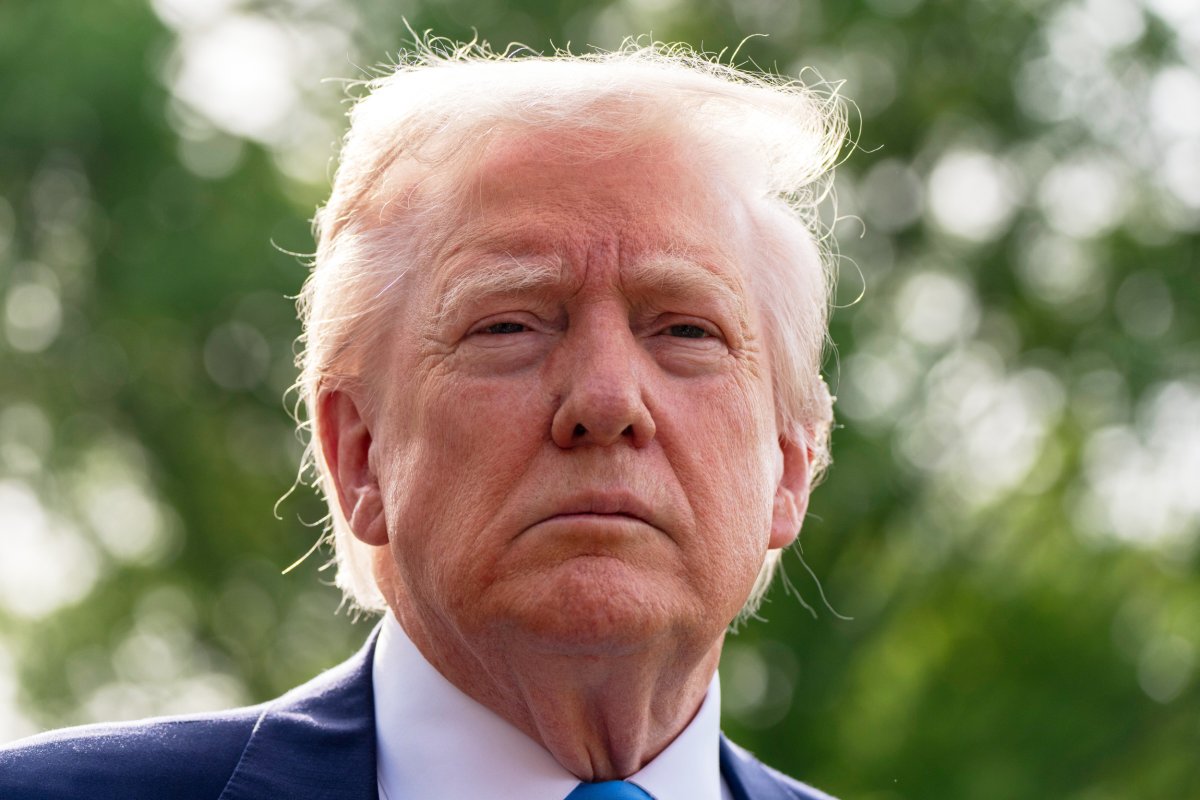-
LAFD’s DEI bureau drew the right’s ire. It’s now on the chopping block - 11 mins ago
-
Why Flags Are At Half-Mast in Florida Today - 13 mins ago
-
Pirates vs. Dodgers Highlights | MLB on FOX - 24 mins ago
-
Soft vine-like robot helps rescuers find survivors - 44 mins ago
-
Trump claims Zelenskyy is ready to give up Crimea in potential boost to Ukraine peace talks - 47 mins ago
-
After the Eaton fire, Altadena dirt went to Tujunga. A backlash ensued - 53 mins ago
-
Donald Trump Demands Investigations Into Negative Approval Rating Polls - 54 mins ago
-
Dr. Drew Pinsky’s wife helped police thwart ‘delusional’ violent stalker - about 1 hour ago
-
Kirk Merritt breaks loose on a 21-yard touchdown rush, extending Roughnecks' lead - about 1 hour ago
-
Did Trump Administration Deport US Children? What We Know - 2 hours ago
Is Gen Z Abandoning Donald Trump?
Once seen as a wild card with surprising appeal among disillusioned young voters, President Donald Trump is now facing a sharp decline in support from Generation Z, according to new polling.
Newsweek analyzed the latest results from major pollsters since early March that included age-specific approval ratings and found that Trump’s standing among the youngest voters is currently at 37 percent approving, while 58 percent disapprove of his job performance.
That signals that Trump’s support among Generation Z voters has tailed off since the 2024 election, when 47 percent of voters aged 18-29 cast a ballot for him, up from 36 percent in 2020.
The New York Times and Siena College recorded the lowest approval rating, with 26 percent of Gen Z voters expressing support and 69 percent disapproving. That was closely followed by a University of Massachusetts poll, which recorded just 28 percent of Gen Z voters reporting their support and 67 percent disapproving.
Similarly, Harvard University (31 percent approve/61 percent disapprove), AtlasIntel (31 percent approve/68 percent disapprove) and Gallup (34 percent/60 percent) paint a bleak picture of Trump’s standing with voters aged roughly 18 to 29.
Across the board, the majority of polls show Trump’s approval hovering between 30 percent and 40 percent, with disapproval frequently exceeding 60 percent.
Meanwhile, analysis by YouGov showed that Trump’s net approval rating among 18-29 year olds has declined by 29 points since he began his second term, from +5 points in January, to -24 points now. However, that has ticked up from -29 points at the beginning of April.
The backlash against Trump has been particularly notable among young men, who helped power his surge in 2024, with 53 percent of men aged 18-44 supporting him in 2024, up from 45 percent in 2020.
Gender scholars like Jackson Katz have put Trump’s win in 2024 among men down to his image as a “tough,” anti-political-correctness figure.
“Many voters base their decisions less on ideology or policy than on perceptions and narrative,” Katz told Newsweek.
“This is certainly the case with many of the young men who voted for Trump in 2024. They were some of the least engaged and lowest information voters. Their support was based not on ideology or policy as much as on a vibe, or a sense, that Trump was the ‘men’s’ candidate.
“He was physically ‘tough’ as evidenced by his response to the Butler, PA, assassination attempt, he’s not ‘politically correct’ and speaks his mind, he’s a businessman who supposedly knows how to manage the economy, and so forth. This is all part of the Trumpian narrative,” Katz said.
But polls now show that Trump’s image as the “men’s” candidate may be beginning to unravel.
According to data provided by YouGov Blue, net approval for Trump declined by 29 points among young male registered voters between January and March, a significantly bigger shift than any other demographic.
“Generally, we expect approval for a president to go up at the start and come down over time, but this is a rapid decline,” the Young Men’s Research Initiative wrote in response.
| Poll | Date | Approve | Disapprove |
| McLaughlin&Associates | April 16-19 | 40 | 61 |
| New York Times/Siena | April 21-24 | 26 | 69 |
| OH Predictive Insights | April 15-18 | 34 | 61 |
| Quantus | April 21-23 | 42 | 52 |
| Harvard Youth Poll | March 14-25 | 31 | 61 |
| Economist/YouGov | April 19-22 | 33 | 57 |
| Civiqs | April 12-15 | 40 | 60 |
| AtlasIntel | April 10-14 | 31 | 68 |
| Gallup | April 1-14 | 34 | 60 |
| J.L. Partners | April 10-14 | 50 | 29 |
| Echelon Insights | April 10-14 | 42 | 55 |
| Harvard-Harris | April 9-10 | 37 | 56 |
| CBS/YouGov | April 8-11 | 43 | 57 |
| YouGov | April 7 – 10 | 30 | 65 |
| University of Massachusetts | April 4-9 | 28 | 67 |
| ActiVote | March 1-30 | 37 | 58 |
| Marquette | March 17-27 | 30 | 70 |
| Emerson | March 8-10 | 40 | 43 |
| CNN/SSRS | March 6-9 | 39 | 61 |
Meanwhile, the latest Harvard Youth Poll, conducted between March 14 and 25 among 2,096 18-to-29-year-olds, found that Trump’s approval rating among Gen Z men currently stands at 34 percent, while 59 percent disapprove.
Economic Anxiety Driving Disapproval
Experts say the slump in the president’s popularity among the youngest voters is no accident. Melissa Deckman, CEO of the Public Religion Research Institute, noted that “economic anxiety among Gen Z may be a driver of Trump’s declining approval ratings.
“While most Americans cited the economy as their main reason for voting for Trump last fall, economic anxiety is more acute among Gen Z, who note that the price of living makes the American dream increasingly out of reach,” she told Newsweek.
Democratic strategist Alejandro Verdin echoed this, saying the economy is central to Gen Z’s turn against Trump. “We saw last election cycle that Gen Z voters were most concerned about their finances, the economy, and affordability. So it’s not surprising at all that as Donald Trump single-handedly tanks the economy, he’s hemorrhaging support from this group.”
Recent polls have reflected this, showing that Gen Z voters are dissatisfied with how Trump is handling the nation’s finances.

Alex Brandon/AP
For example, an NBC News poll, conducted between April 11-20 among 19,682 adults, showed that seven in 10 members of Gen Z disapprove of the way Trump is handling inflation and the cost of living—14 percentage points higher than the rate of disapproval among the oldest adults surveyed. Three in 10 American adults under 30 years old say their personal financial situation has gotten worse compared to a year ago.
The latest YouGov/Economist poll also reflected significant discontent among Gen Z voters about Trump’s handling of the economy, with just 36 percent saying they approve and 53 percent disapproving. On the issue of inflation, Trump’s ratings were even worse, with 30 percent approving and 61 percent disapproving.
Fox News’ poll also showed that fears about a recession are very real among Gen Z, with 77 percent reporting that they are “very” or “extremely” worried about the economy entering a recession this year.
It comes after Trump unveiled a new round of tariffs earlier this month. The announcement sent financial markets into turmoil: Wall Street suffered its worst single-day loss since the pandemic era, and global markets followed suit, before rebounding days later.

Photo-illustration by Newsweek/Getty
Deep-Rooted Distrust
But some analysts argue that Gen Z’s frustration with Trump isn’t solely economic and is rooted in a deeper distrust of institutions and authority, which they see Trump as embodying rather than challenging.
“Young people did not move towards Trump in 2024 because they’re more MAGA, they moved towards Trump because they’re sensitive to economics & don’t trust the system” pollster Adam Carlson said on X, formerly Twitter.
Deckman added that this is particularly true among young men, who were disillusioned with [Joe] Biden during the election, and now may be becoming disillusioned with Trump.
“Gen Z is far more distrustful of the federal government than older Americans. While Trump in many ways embodies the political establishment today, Zoomers were particularly disillusioned with Joe Biden’s unwillingness to step aside and with his job performance, and many, particularly young men, seemed willing to give Trump another chance. But Trump is throwing that chance away,” she told Newsweek.
A Young Men Research Initiative study showed that social media has played a big role in eroding trust in politicians among male Gen Z voters. Platforms like YouTube, TikTok, and Instagram serve as key news sources for young men, and algorithmic amplification of negative content often erodes confidence in whoever is in power.
Meanwhile, increasingly, popular influencers like Joe Rogan and Dave Portnoy—once seen as aligned with Trump—have begun criticizing his policies and decisions, signaling cracks in a once-sturdy coalition.
Earlier in April, Rogan criticized the president’s administration over the deportation of a professional makeup artist and hairdresser to a prison in El Salvador, calling it “horrific.” He also described Trump’s trade war with Canada as “stupid.”
Portnoy has also criticized Trump’s tariffs, revealing that he had lost $7 million in stocks and crypto shortly after the “Liberation Day” tariffs were announced.
Additionally, a July 2024 survey by the Young Men Research Initiative (YMRI) found that inflation was the top concern for young men during the election—a factor that may now be driving their shift away from Trump, who made the economy a key part of his campaign, promising to bring prices down “on day one.”
Instead, prices for essentials like eggs and electronics have kept rising in recent months due to a combination of an Avian flu outbreak and Trump’s tariffs, deepening frustration among young voters.
“Young men may be looking at Trump’s policies—or at least those dominating the headlines—and wondering if they were sold a false bill of goods,” the researchers wrote.
Meanwhile, Lucas Walsh, a youth political behavior expert, said that cost-of-living pressures and a deep distrust in both major parties are fueling Gen Z’s volatility. “They grew up during the global financial crisis, the pandemic, massive geopolitical change and increasingly extreme weather events,” he said.
“Like many Americans, young people seek security. In an uncertain world, all bets are off.”
In 2024, 39 percent of young men identified as independents—more than those who identified as Democrats or Republicans, according to the YMRI. They also express unusually high levels of political disinterest and cynicism toward elected office: in YouGov polling, “elected official” ranked last among the careers young men admire.
Some conservatives, however, see the situation differently. GOP strategist Matt Klink argued that the data may be overblown. “These polling results are a one-off and don’t track with those in other private party surveys that I’ve seen,” he said, noting that while some slippage is expected, “Gen Z males…haven’t gone anywhere. They may be frustrated at the pace of change, but chalk that up to the impatience of youth.”
Republican strategist John Feehery added: “I am surprised the numbers on Gen Z are that high. I hardly think you could say that Gen Z men are turning away for Trump. Maybe a little slippage, but not enough to panic.”
And indeed, there are some exceptions to polls that have shown Trump’s approval rating underwater among the youngest voters. J.L. Partners found Trump with 50 percent approval and only 29 percent disapproval—a notable outlier. CBS/YouGov (43 percent/57 percent) also showed relatively stronger performance compared to the broader trend.
Additionally, a Yale Youth Poll, which surveyed 4,100 registered voters between April 1 and April 3, including an oversample of 2,024 voters aged 18 to 29, showed that young voters are now overwhelmingly Republican, with voters aged 18 to 21 leaning Republican by 11.7 points when asked who they would support in the 2026 Congressional elections, while voters aged 22 to 29 favored Democrats by 6.4 points.
For some analysts, this is a sign that Trump can easily win young voters, especially young men, back before the midterms.
According to the YMRI, young men may be the most “swingy” voters in the electorate today. Many of them voted for Biden in 2020, swung to Trump in 2024, and are now drifting again.
Klink added: “Gen Z male voters are fickle, but since many of them have cast a ballot for Donald Trump and Republicans, the likelihood of them doing so again is strong.”
Source link































